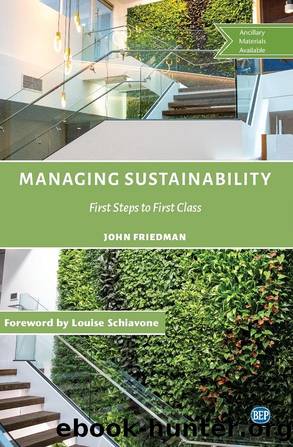Managing Sustainability: First Steps to First Class by John Friedman

Author:John Friedman
Language: eng
Format: epub
Publisher: Business Expert Press
Published: 2020-08-15T00:00:00+00:00
Using Your Influence to Advance Sustainability (Supply Chain, Industry, and Business Standards)
The concept “not in my backyard” has become obsolete because, in our globally connected world, it becomes impossible to ignore that everyone’s backyard is someone else’s front yard.
As we have seen earlier, brand reputation is an important value driver for businesses. In reputation and brand management, companies that insist that suppliers meet rigorous sustainable business standards are protected from damage to their brand and reputation from issues such as child labor, substandard wages, environmental mismanagement, etc. And they are helping prevent these practices by providing a financial incentive—their business—for acting in a socially responsible manner.
Leaders know that they need to look beyond their own actions and values, beyond those things over which they control to those things over which they can exert influence, such as their supply chains. This includes holding suppliers to adhere to values relating to human rights, working and labor conditions, living wages, environmental stewardship, and governance issues. Companies recognize that they cannot outsource problems in an effort to distance themselves from their negative impacts—as BP discovered when it attempted to lay the blame for the Deepwater Horizon disaster at the feet of the companies it had selected to work on its behalf. Similarly, after a rash of vehicles surging out of Park and causing accidents, Toyota could not credibly argue it held a core value of safety by attempting to blame problems with the throttle mechanisms built for them by a different company.
Companies are requiring suppliers to do more than guarantee a level of quality for the products that they supply; some are requiring that suppliers maintain a chain of custody to ensure that the products that they are using conform to environmental and social values as well. Large power purchasers have been exploring the extent of the influence that they can have on their suppliers’ behavior by implementing requirements beyond prices. Examples include Walmart’s efforts to only sell certified sustainable seafood. To be a supplier to Walmart, the giant retailer must be convinced—using third-party validation—that the seafood products that they are being offered to sell to customers are, in fact, sourced from sustainable species, caught only in places where those fish are plentiful, and that they are being fished in a responsible manner.
The new focus on a “sustainable” economy is creating opportunities for companies that offer products or services that help other companies reduce their environmental impacts, and even those that track information back to point, country, or company of origin. A great example is in information technology, which can be used not only to help improve efficiencies in manufacturing but also to look at entire systems and provide vital information. In day-to-day application, measurement devices that monitor traffic flow can be used to automatically adjust traffic lights to facilitate safety and efficiency of transportation. Buildings that install monitors of electric power use help manage the peaks and valleys in consumption, reducing energy costs and helping utilities determine where and when power is needed.
Download
This site does not store any files on its server. We only index and link to content provided by other sites. Please contact the content providers to delete copyright contents if any and email us, we'll remove relevant links or contents immediately.
Storytelling for dummies by Andrea Fontana(1519)
Effortless by Greg McKeown(1488)
The Practice by Seth Godin(1442)
Mastering Blockchain by Lorne Lantz(1427)
Blockchain Quick Reference by Paul Valencourt & Samanyu Chopra & Brenn Hill(1181)
Business Information Systems Workshops by Unknown(979)
The wind in the willows by Kenneth Grahame(949)
Mastering Blockchain by Lorne Lantz & Daniel Cawrey(931)
How to Lead by David M. Rubenstein(860)
The Ape in the Corner Office by Richard Conniff(819)
Handbook of Big Data Analytics by Unknown(750)
Social Media Engagement For Dummies by Aliza Sherman(737)
Getting Started with Data: The first book you should read to successfully get along with data. by Menegatti Gabriel & Team Simbiose Ventures(733)
FunRetrospectives: activities and ideas for making agile retrospectives more engaging by Paulo Caroli & Tainã Caetano Coimbra(724)
Taking Care of Yourself (HBR Working Parents Series) by Harvard Business Review(723)
Evernote for Self Publishing: How to Write Your Book in Evernote from Start to Finish by Jose John(702)
Business Storytelling For Dummies by Unknown(698)
Help! My Facebook Ads Suck-- by M. D. Cooper & Jill Cooper(685)
A Leader Listens by Ajay Banga(670)
